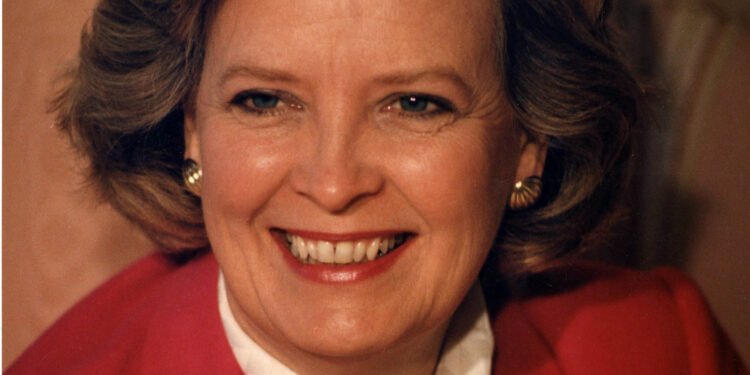Courtesy of Northern Kentucky Tribune
Martha Layne Collins, who died Nov. 1 and was interred Monday, was a good governor. She grew in office, advanced a state that greatly needed advancement, and provided important lessons for women in politics – as the state’s first female governor, one who allowed her husband to peddle influence.
Collins started out as a teacher, and as governor she set the state on the road to education reform. The progress in her 1983-87 term was aided by the national school-reform movement and paled in comparison to the 1990 Kentucky Education Reform Act, but the Prichard Committee for Academic Excellence said the lawsuit that led to that landmark legislation was filed in “the education-focused atmosphere” that she helped create.
Her greatest legacy is making Kentucky a major automobile-manufacturing state, through recruitment of the Toyota plant to Georgetown. Yes, Toyota might have come if she hadn’t been elected – and if it hadn’t, some other Japanese automaker probably would have, if for no other reason than to get two more friendly U.S. senators. But speculation aside, Collins deserves credit for her leadership and salesmanship.
Larry Hayes, her Cabinet secretary, said in his eulogy of Collins that after Toyota initially passed up Kentucky in its search for a U.S. plant site, she called the company’s American sales chief, who got her a meeting with its top brass. They wanted “1,500 acres of free, flat land,” which the state didn’t have, but obtained with the help of Norfolk Southern Corp., whose railroad serves the plant, Hayes said.
“She was really the one, with her personality and her ability to connect with some people . . . and her courage in taking the step” of giving land to a corporation, which the state constitution explicitly banned. State lawyers noted that, but “We kind of had to not listen to that part of it because she said ‘We’ve got to do this.’ She saw that,” Hayes said, adding later, “She truly cared about making things better for people.” A sharply divided state Supreme Court approved the deal a few months before Collins left office, and the state’s incentives to Toyota have long been accepted as a good investment in the state’s economic future.
The greatest blemish on Collins’ record was her husband’s 1993 conviction for extorting state bond underwriters, which sent him to prison and ended her political career. If she didn’t know what he was up to, as she averred, she should have known.
Bill Collins was part of a campaign team of old-school political operators and others who didn’t fit in the Democratic primary campaigns of Louisville mayor Harvey Sloane and former human-resources secretary Grady Stumbo. Though she became only the third American woman elected governor in her own right, Collins was the most traditional of the three candidates. She relied on local politicians, personal connections and quiet but crucial help from Democratic U.S. Sen. Wendell Ford, in whose campaigns she had worked.
She was an adept, attractive and energetic campaigner, and as the first Kentucky woman with the chance to become governor, something of a curiosity. Women brought husbands to see her, and she won some over. A 1983 poll found that most people who said they voted for Collins also said they had met her – amazing at a time when the previous election seemed determined by television.
That election had been won by businessman John Y. Brown Jr., who loved national politics but seemed to think that local Democratic events were beneath him. Collins, as lieutenant governor, was the next option for most organizers. She turned many of them into supporters, and made enough people think she actually could be governor that she edged out Sloane by 4,532 votes. (She was accustomed to close elections; she won the 1979 LG primary by 3,338 votes over favorite Bill Cox.)
Though Brown’s style helped Collins win friends, he left her with a legislature that was charting its own course after decades of domination by governors. Under Collins, it became all the more a broker of special interests, albeit with extra focus on issues she deemed important, such as education and workers’ compensation. She disliked the confrontation that forges compromise, but she and her associates said “her political style is too subtle to be measured by traditional standards,” as reported by C-J Political Writer Bob Johnson as she left office. She told him, “I have never been a pushy broad.”
Collins’ other important legacy remains unfulfilled. When she was governor, women held four of the seven statewide elective offices, and the age of women in Kentucky politics seemed to have arrived. But that majority hasn’t been repeated, and no other woman has been governor, or even nominated for the job. Bill Collins’ case may have had something to do with that, but I think it stems more from our state’s deeply traditional culture, which resurged in politics when Republican social issues drove the state rightward after the Collins years. The state was never more Democratic in voter registration than it was in the year she was elected.
***
Al Cross (Twitter @ruralj), columnist, is a professor in the University of Kentucky School of Journalism and Media and director of its Institute for Rural Journalism and Community Issues. His opinions are his own, not UK’s. He was the longest-serving political writer for the Louisville Courier Journal (1989-2004) and national president of the Society of Professional Journalists in 2001-02. He joined the Kentucky Journalism Hall of Fame in 2010. NKyTribune is the anchor home for Al Cross’ column. His columns are offered to other publications throughout the Commonwealth, with appropriate attribution.




















